Contents
- Message from the Chair
- Message from the Program Officer
- Message from DCPB Secretary
- George Bartholomew Award, 2022 – Dr. Martha Muñoz
- DCPB Best Student Presentation Awards
- Phoenix 2022 – A bizarrely memorable meeting
- DCPB Member Research Highlight – Dr. Richelle Tanner
- Candidates for DCPB Chair-Elect
- Candidate for DCPB Program Officer
Message from the Chair
Jon Harrison, chair.dcpb@sicb.org
I’m excited to work with the DCPB members and executive officers to promote comparative physiology and biochemistry in SICB and beyond. Essentially, I’ve accomplished almost nothing since taking over from Ken a few weeks ago, though our executive team did agree that some of our DCPB funds (from your $5 extra divisional contribution) will support the upcoming 10th APS Intersociety Meeting in Comparative Physiology meeting this Oct. 28-31 in San Diego: http://apscomphys2022.org/. The call for abstracts for that meeting has recently opened, and the deadline to submit is June 24, 2022.
One thing I have learned is that with the database change underlying the new SICB website, a few members’ divisional affiliations were not maintained (I was supposedly no longer in DCPB). As our membership to some extent determines our financial allotment, please go to www.sicb.org, and login (and renew your membership if necessary) and check your divisional affiliation.
Right now is the perfect time to contact Mike Sears (our awesome DCPB program officer) with your ideas about organizing a symposium or workshop. Having good symposium ideas from our members is critical to the quality of the SICB meeting. You aren’t too young to organize a symposium. Graduate students and postdocs, you can organize symposia yourselves or with faculty. It’s a great opportunity to network, see the speakers you want to, and make an impact on the field.
I am just learning the ropes of this job, and I would love to hear from you. If you have suggestions on how SICB or DCPB should run, please let me know. If you’d just like to be more involved and aren’t sure how to do so, please email me at j.harrison@asu.edu. We are always looking for free help! 🙂
Message from the Program Officer
Mike Sears, dpo.dcpb@sicb.org
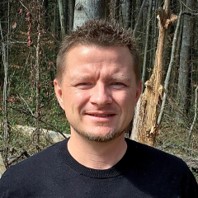
I want to take the time to thank DCPB’s Executive Committee as well as SICB’s Programming Committee for pulling off a successful SICB/SICB+ annual meeting. Organizing our program is no small task under normal circumstances, but pivoting at the last minute to accommodate everyone given a COVID surge required a heavy lift by many folks. Regardless, the symposia and talks supported by our division were a big success, and hopefully things will return to more normal conditions in Austin.
Many of the great ideas for initiatives that make SICB and its annual meeting more inclusive and supportive come from the next generation of scientists. I want to encourage the full participation of all members in the society and in our DCPB. To our student and postdoctoral members, please take the opportunity to engage in society business, vote, and participate in symposium and workshop development. Your science, voices, and visions are the future of the society and of DCPB. You can follow our Twitter feeds @sicb_dcpb, @SICB_SPDAC, and @SICBtweets. Please e-mail me at DPO.DCPB@sicb.org with any ideas that you may have for meeting activities that support a diverse membership and advance their scientific and professional goals.
Students, don’t forget about the opportunity to participate in the “Best Student Presentation” competitions. Thank you to everyone who volunteered, chaired a session, and participated in or scored the best student presentations this year. Your contributions make the meetings a success!
We hope to see you in Austin, TX in 2023, where DCPB will be co-sponsoring a diverse lineup of five symposia:
- “Biology at birth: the role of infancy in providing the foundation for lifetime success,” organized by Christopher Mayerl and Rebecca German
- “Daily torpor across birds and mammals: Recent progress and how do we advance the field?” organized by Anusha Shankar and Ken Welch
- “Micro-scale life, large-scale influencers: Functional consequences of small-scale biophysical processes,” organized by Jeanette Wheeler and Karen Chan
- “Visions for a diverse, inclusive & safe future for field biology,” organized by Vanessa Hilliard Young, Robin Verble, and Corinne Richards Zawacki
- “Sex Diversity and variation,” organized by Kelsey Lewis and Sam Sharpe.
Finally, we are looking for outstanding symposium proposals for the Seattle 2024 meetings. The symposia are a vital component of our ICB journal. Our division has a history of co-sponsoring strong symposia that highlight emerging areas in integrative and comparative biology. Proposals will be due in late summer of 2022. Symposia that integrate across disciplines and include a diversity of speakers across speaker gender, background, and academic rank are more likely to gain broad support within SICB and with funding agencies such as NSF.
Student and postdoc members, you are the future of integrative and comparative biology, and we encourage you to take part in organizing a symposium or workshop; it is a great opportunity for professional and scientific development. Feel free to contact me at the e-mail address above or SICB Program Officer Thomas Sanger (programofficer@sicb.org) with ideas for symposia or with questions. I am happy to brainstorm ideas, facilitate collaborative symposium development, and provide past successful proposal examples to help in your proposal development and in obtaining external funding to help support the attendance of your speakers.
Finally, I encourage you to submit your research findings to the fully open-access SICB society journal, Integrative Organismal Biology. SICB members receive a significant discount for publication charges, making this one of the most reasonable open-access publishing options available!
Message from DCPB Secretary
Caroline Williams, secretary.dcpb@sicb.org
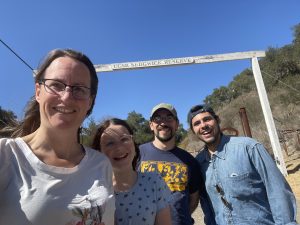
It is an exciting time for comparative physiology and biochemistry, and our members have been making important discoveries that expand our knowledge of how unity and diversity in form and function came to be, and how life on Earth is changing in this era of rapid change. I’m looking forward to serving the division as secretary for the next two years, so that we can communicate the achievements of our membership within and beyond the division. Many thanks to outgoing past secretary Heather Liwanag for serving the division over the past two years, and for showing me the ropes!
Want to engage with your division? Follow us on social media (Twitter: @sicb_dcpb Facebook: https://www.facebook.com/groups/Div.Comp.Phys.Biochem/). If you have any news to share with our membership, including opportunities or achievements, please email me at cmw@berkeley.edu.
We have made some changes to our division bylaws to bring them in line with society-wide bylaws. Changes were fairly minor and included removing all gendered pronouns and replacing with them/theirs, reducing the time that ballot changes must be posted for members from 60 to 30 days, removing requirements for mail-in ballots (all ballots will now be electronic), reducing the nominating committee to two (down from three) DCPB members in addition to the Past Chair, and replacing the Graduate Student Representative with a Student/Postdoctoral Affairs Committee representative (SPDAC). We clarified that the DCPB Chair suggests DCPB members to serve on the society-wide SPDAC committee, and the appointment is made by the SICB president. Students awarded the Best Student Presentation Awards are not eligible for future DCPB Best Student Presentation awards.
This spring, we are holding elections for Chair-Elect and Program Officer of DCPB. The division relies upon the service of our members, and we have an amazing group of people who have stepped up to volunteer to serve this time. Dr. Justin Havird and Dr. Jason Podrabsky are running for Chair-Elect, and Dr. Alex Gerson is running for Program Officer. Please take a moment to read the candidate bios and vote in the upcoming election. All members, including student members, are able to vote in this important election. On behalf of DCPB, thank you to all the candidates for your willingness to serve!
George Bartholomew Award, 2022 – Dr. Martha Muñoz
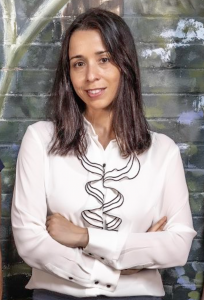
The winner of the 2022 George Bartholomew award was Dr. Martha Muñoz, from the Department of Ecology and Evolutionary Biology at Yale University. Martha’s research has been illustrating the fine interplay between physiology, behavior, and morphology during evolutionary change. Using models systems of Caribbean anole lizards and now salamanders, Martha’s elegant work is showing that behavior can be both a driver and a brake on evolutionary change. Upper thermal limits in anoles evolve more slowly than lower thermal limits, because thermoregulatory behavior during the day can keep lizards within their thermal preference range, while at night the cold temperatures cannot be escaped so easily. Upper elevation habitats are much colder than the thermal preferences of the lizards, which drives upper elevation lizards to thermoregulate more effectively than low elevation lizards by seeking warm boulders. This in turn leads to morphological shifts including flatter skulls, allowing them to squeeze into the cracks of warm boulders. Thus, thermoregulatory behavior places a brake on physiological evolution of upper thermal tolerances, but provides a motor for morphological evolution. Martha was also recognized by the Gans award for functional morphology. Congratulations Martha!
DCPB Best Student Presentation Awards
We are pleased to announce the winners of the DCPB best student presentations from the Phoenix meeting:
Talia Head (Colorado State University) for their poster titled “Characterization of cGMP-dependent protein kinase in the crustacean molting gland.”
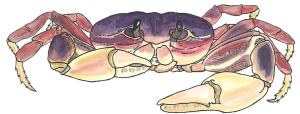
Talia’s work is elucidating the role of protein kinase G (PKG) in the molt-inhibiting hormone pathway within the molting gland (Y-organ, YO) of the decapod crustaceans Gecarcinus lateralis and Carcinus maenas. Talia has identified two isoforms of PKG which appear to have opposing roles within the YO, and also appear to be conserved among crustaceans. The next step in Talia’s work is to use phospho-proteomics to identify the potential targets of PKG within the YO.
Shai Shaked (PhD candidate, Ben-Gurion University) for their talk entitled “The involvement of a phosphate transporter in crayfish molt and mineralization.”
Shai studies how phosphate transporter knock-down alters calcium carbonate mineralization in crayfish. The notion that phosphate affects calcium carbonate mineralization was hypothesized for a long time. In Shai’s study, a newly found phosphate transporter, designated Cq-SLC20, was knocked down using RNAi injections in molting Cherax quadricarinatus crayfish. Following phosphate transporter silencing, calcium carbonate biomineralization at the gastroliths (transient storage organs for minerals) was shifted from amorphous calcium carbonate (ACC) to the crystalline form. These findings show, for the first time, the role of phosphate in ACC stabilization on crustacean biomineralized tissues.
Congratulations to Talia and Shai, and all our other amazing student presenters. Thank you to DCPB student and postdoctoral affairs committee (SPDAC) representative Dr. Maria Stager for running this year’s Best Student Presentation competition, and to all the judges.
Phoenix 2022 – A bizarrely memorable meeting
Jon Harrison, Chair
Meghan Duell and I organized a symposium (Causes of Hypometric Metabolic Scaling) for the 2022 meeting that will, for me, go down in history as bizarrely memorable. As the meeting approached, more and more participants decided to present virtually, mostly due to COVID concerns. Then co-organizer Meghan couldn’t make it due to covid-restrictions on coming back into Canada. Then I caught COVID myself, and was sick in bed the days before the meeting (and testing positive through the entire meeting). Ummat Somjee was trapped by flight problems from Panama, and though he made it to the meeting on time, felt he had likely been exposed and so should not attend the meeting. That left one presenter, the eminent Jim Brown, to present in person. No worries! We had recorded video for everyone. All speakers participated in a zoom room, watching each other’s talks simultaneous with the audience. My graduate student, Jordan Glass, was in the symposium room. At the end of the talk, the speaker called his cell phone and Jordan relayed questions to the speaker, and then held his phone up to the microphone for the speaker to reply. It was seriously imperfect, but I think way better than expected. Apparently around 40 people were present. We had a great zoom workshop afterwards, and have been working hard together since on a joint “white paper” which we hope will integrate the diverse perspectives of the speakers. It was more fun than a virtual meeting had any right to be. But I really missed the “Insecty Drinks.”
DCPB Member Research Highlight – Dr. Richelle Tanner
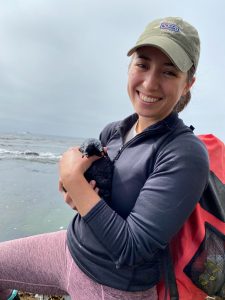
Dr. Richelle Tanner recently started her lab group, the SEACR Lab, at Chapman University with a dual appointment in the STEM and humanities colleges as an Assistant Professor of Environmental Science & Policy. She and her colleagues bridge the natural and social sciences in their investigations of the effects of climate change on communities, both ecologically and with respect to environmental advocacy in minoritized communities. Dr. Tanner has just published the first Mytilus californianus transcriptome and an analysis of the importance of biological variation in stress responses in Molecular Ecology, but she also recently won a contract with the Delta Science Council to investigate the applied ecological and sociological best practices of invasive species management alongside four agency and academic collaborators. Her science communication research has been featured in the Chronicle of Higher Education and she is an upcoming keynote speaker at the Sustainable Living Fair hosted by Citizens’ Climate Lobby, focused on empowering communities with evidence-based climate storytelling tools. Her work also spans investigations of systemic harm in higher education, with a paper in Science this month (Burnett et al. 2022) highlighting the importance of inclusive survey design for conference societies.
Candidates for DCPB Chair-Elect
Justin Havird
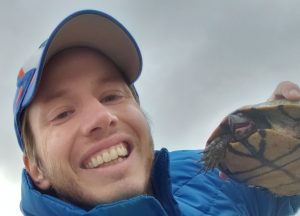
Current position: Assistant Professor, Integrative Biology, University of Texas, Austin, TX, USA
Education: B.Sc., U Florida, Gainesville, FL, USA (2006); M.Sc., U Florida, Gainesville, FL, USA (2008); Ph.D. Auburn University, Auburn, AL, USA (2014); Postdoctoral Fellow, Colorado State University, CO, USA (2018).
Professional Experience: Assistant Professor (2018-current), University of Texas, Austin, TX, USA
SICB Activities: Symposium co-organizer (with Geoffrey Hill), “Beyond the Powerhouse” (2019). Invited symposium presentations 2016 (“Tapping the Power of Crustacean Transcriptomes to Address Grand Challenges in Comparative Biology”), 2020 (“Building Bridges from Genome to Phenome”), and 2022 (“DNA Metabarcoding Across Disciplines”). DCPB Student presentations judge (2017-2022). Press release journalist: 2014-2018. Student photo journalist: 2013. Attended annual meetings: 2006, 2007, 2013-2022.
Other Memberships: Society for Molecular Biology and Evolution, Society for the Study of Evolution
Research Interests: My research focuses on how mitochondrial processes influence broad patterns in evolution, ecology, and physiology. We use -omics datasets to ask questions about molecular evolution and environmental adaptation. Wet lab work includes examining metabolic rates as a function of organism and environment, as well as characterizing different types of mitochondrial respiration in response to genetic and environmental variation. A major current them in the lab is the causes and consequences of mitochondrial mutations. We work with a diversity of organisms, from microbes, to plants, to invertebrates and vertebrates. We study organisms in their natural environments when we can and routinely perform field work in the Hawaiian anchialine ecosystem. Beyond these general themes, I am interested in environmental physiology, molecular evolution/phylogenetics, and marine ecology.
Statement of Goals: I have been a part of SICB and DCPB since starting research as an undergraduate. I was welcomed at my first meeting and have continued to benefit from the society, both professionally and personally. I am therefore happy to serve the society and DCPB. As chair-elect, my overall goal would be to promote comparative physiology and biochemistry in the society and beyond. Specifically, I would work with other division officers to continue to make sure the division’s interests are represented well in the society, including attracting young scientists to our division, and encouraging them to present their work, organize symposia, and publish in our journals. I am committed to increasing the diversity in our division, through highlighting overlooked scientists already in DCPB and recruiting new members. Finally, students are the strength of SICB and I will work with the society to remove barriers to student opportunities.
Jason Podrabsky
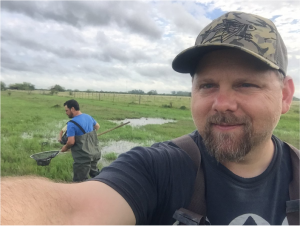
Current Position: Professor in the Department of Biology and Center for Life in Extreme Environments, and interim Vice-President for Research and Graduate Studies at Portland State University
Education: Ph.D. from the University of Colorado, Boulder, and postdoc with George Somero at Hopkins Marine lab
Professional Experience: Assistant Professor, Department of Biology, Portland State University (2003-2008); Director, PSU Keck Genomics Facility (2006-2013); Associate Professor, Department of Biology, Portland State University (2008-2011); Professor, Department of Biology, Portland State University (2011-present); Chair, Department of Biology, Portland State University (2013-2016); Associate Vice President for Research, Portland State University (2016-2019); Interim Vice President, Research & Graduate Studies (2019-present). Editorial board memberships: BioScience, Comparative Biochemistry and Physiology, Environmental Biology of Fishes, Frontiers in Physiology.
SICB Activities: I am a long-time member of SICB and DCPB (1996-present), helped organize and gain grant funding for SICB symposium Life on the Edge: Biology, Physiology, and Evolution of Extremophiles (2016), and have served as DCPB program officer.
Other Memberships: American Physiological Society (1995-present), American Killifish Association (1994-present).
Research Interests: I study how organisms (specifically fish) adjust or adapt their life history, behavior, physiology, biochemistry, and molecular biology in order to thrive in marginal or extreme environments. A special focus is examination of how development and mitochondrial metabolism are regulated during seasonal dehydration and in responses to anoxia/hypoxia in fishes that employ diapause to survive harsh conditions. I use multi omic approaches, with current special interests in roles of vitamin D and micro-RNAs in developmental regulation.
Statement of Goals: My goals for the section are to increase participation and membership, and to create and develop active communities of practice within the section.
Candidate for DCPB Program Officer
Alexander R. Gerson
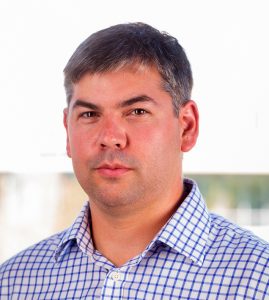
Current Position: Associate Professor, Dept. of Biology, University of Massachusetts, Amherst.
Education: B.Sc. SUNY ESF 2004; M.Sc University of Western Ontario 2007; Ph.D. University of Western Ontario 2012
Professional Experience: NSERC Postdoctoral Fellow U. New Mexico 2013-2014
SICB Activities: Member since 2007; DCPB nominating committee 2020-2021
Other Memberships: American Physiological Society, American Ornithological Society, Canadian Society of Zoologists
Research Interests: My interests lie in the field of integrative eco-physiology and my research has focused primarily on the environmental physiology of birds. I seek to understand how birds are able to overcome extreme environmental challenges, such as those encountered during long distance migration or while living in the hottest deserts on Earth. Through investigation at multiple levels of organization, from the cellular level to the community level, my research program aims to better understand the mechanic basis, flexibility, and limitations of the physiological response of animals to extreme environmental conditions.
Statement of Goals: SICB has been my primary society since I was a PhD student and I look forward to this meeting every year. I have had so many positive experiences as a member of this society and I feel as PO I can give back to the society, and have a positive impact on the annual meeting.
